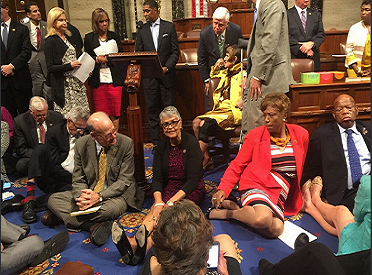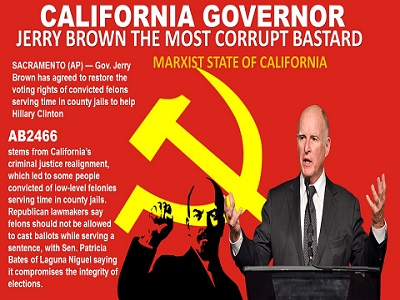Election Fraud & Corruption: Who Will Fight to Prevent Election Crimes?
 Last week in the city of Hoboken, New Jersey, a woman suspected of promoting a voter bribery scheme by using the United States Postal Service, according to the office of Craig Carpenito, the U.S. Attorney in Newark, New Jersey.
Last week in the city of Hoboken, New Jersey, a woman suspected of promoting a voter bribery scheme by using the United States Postal Service, according to the office of Craig Carpenito, the U.S. Attorney in Newark, New Jersey.
The 55-year-old suspect, Lizaida Camis, who lives in Hoboken — the hometown of U.S. Sen. Robert Menendez, a Democrat who recently was charged with federal crimes — is charged with a violation of the Travel Act for her use of the mails to aid voter bribery in the state of New Jersey.
She made her initial appearance Friday before U.S. Magistrate Judge Mark Falk in a Newark federal courtroom.
According to documents filed in this case and statements made in court:
Under New Jersey law, registered voters are allowed — even encouraged — by the Democratic Party and political activists to cast a ballot by mail rather than having to travel to a voting station in person. To receive a mail-in ballot, voters must completely fill-out and submit to their county clerk’s office an Application for Vote By Mail Ballot (VBM Application).
Once the voters’ applications are processed, they are sent a mail-in ballot.
From October 2013 through November 2013, Lizaida Camis offered cash payments to certain Hoboken voters in the amount of $50 each if those voters applied for and cast mail-in ballots for the November 2013 Hoboken municipal election.
Camis provided these voters with VBM Applications and then delivered the completed applications to the Hudson County Clerk’s Office.
According to FBI Special Agent-in-Charge Gregory Ehrie, “After the mail-in ballots were delivered to the voters, Camis went to their apartments and, in some cases, instructed the voters to vote for the candidates for whom Camis was working. Camis promised the voters that they would be paid $50 for casting their mail-in ballots and told them that they could pick up their checks after the election at an office on Jefferson Street in Hoboken. Bank records show that voters living in Hoboken received $50 checks from entities associated with the campaigns that employed Camis.”
Camis faces a maximum penalty of five years in prison and a $250,000 fine.

Unbridled public corruption poses a fundamental threat to national security and the way of life for the American people. It might affect just about everything in this nation from how well our borders are secured and our neighborhoods are protected to how indictments are obtained and verdicts are handed down in courts.
Even more sinister is the fact that those involved in committing election fraud and corruption may believe they are right and those opposed to their fraudulent acts are on the wrong side of history. It’s similar to a Hollywood movie that portrays gangsters as the heroes fighting against corrupt businessmen, police departments and prison corrections officers. But news outlets are not Hollywood entities and are not mandated to take sides when reporting about an incident, whether it is crime or terrorism or social conditions or any other subject.
Corruption also takes a significant toll on the taxpayers’ wallets and pocketbooks by siphoning off tax dollars. It is estimated that public corruption costs the U.S. government and the public billions of dollars each year. The FBI is uniquely situated to combat corruption, with the skills and capabilities to run complex undercover operations and surveillance, however in order to gain the public’s trust it must be done by apolitical agents who take an oath of office to uphold the U.S. Constitution, not some whim of a shady politician.
Unfortunately, as more Americans are becoming aware, the FBI and the Department of Justice have become more politicized — some say more weaponized — by a cabal of influential politicians, unscrupulous “journalists” and wealthy power-brokers than at any other time in U.S. history.
Records obtained from federal agencies by non-profit private watchdog groups have shown that the well-connected swells who populate, what President Donald Trump termed, The Swamp. Such swamp-dwellers appear to receive a special dispensation from obeying the laws and regulations that are enforced against the vast majority of Americans.
Election Crimes
 In democratic societies like the United States, the voting process is a means by which citizens hold their government accountable; conflicts are channeled into resolutions and power transfers peacefully. A system of representative government works only when honest ballots are not diluted by fraudulent ballots.
In democratic societies like the United States, the voting process is a means by which citizens hold their government accountable; conflicts are channeled into resolutions and power transfers peacefully. A system of representative government works only when honest ballots are not diluted by fraudulent ballots.
The current debate over illegal immigrants being involved in casting illegitimate votes pits two diametrically opposed philosophies against one-another: The idea of allowing or ignoring millions of votes being cast by non-citizens dilutes the power of votes by citizens.
According to the FBI: Through its Public Corruption Unit, agents have an important but limited role in ensuring fair and free elections. Election crimes become federal cases when:
- The ballot includes one or more federal candidates;
- The crime involves an election official abusing his duties;
- The crime pertains to fraudulent voter registration;
- Voters are not U.S. citizens.
Federal election crimes fall into three broad categories—campaign finance crimes, voter/ballot fraud, and civil rights violations.
If you think an election crime is occurring, call the election crimes coordinator at your local FBI office.



Pingback: Election Fraud & Corruption: Who Will Fight to Prevent Election Crimes? – USSA News | The Tea Party's Front Page